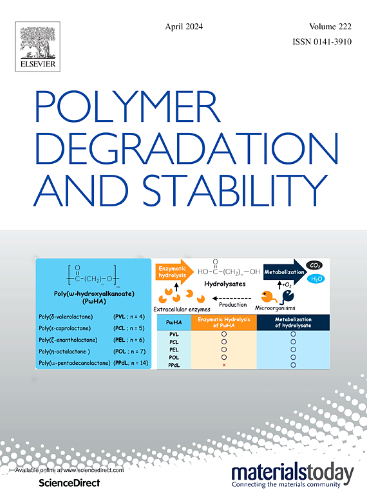Enhanced recyclability of polycaprolactone via precisely defined incorporation of acetal bonds
IF 7.4
2区 化学
Q1 POLYMER SCIENCE
引用次数: 0
Abstract
Here, we report the synthesis of polycaprolactone with enhanced recyclability without losing its thermal properties. Firstly, we synthesised reactive telechelic polycaprolactones with hydroxyl end-groups, with molar masses in the 1000–4000 g/mol range. Then, homo polycaprolactone was reacted with a model aldehyde (paraformaldehyde) in the presence of a weak acid catalyst to demonstrate the possibility of obtaining high-molecular-weight PCL with modified degradability from a high molecular mass polycaprolactone. The materials were evaluated for their recyclability through the hydrolysis of the acetal bond in the presence of water and the presence of acids of different strengths. The best result was obtained for the solution of hydrochloric acid, leading to the recovery of the reactive polycaprolactone block. The introduction of acetal bonds to the polycaprolactone macromolecules in a strictly defined way improved the chemical recyclability of prepared polymers, retaining their crystallinity and crystallisation temperature unchanged. Furthermore, we demonstrated that the recovered polycaprolactone block can be successfully repolymerized to obtain a material with the same thermal properties as the starting materials.
通过精确定义缩醛键的结合,增强了聚己内酯的可回收性
在这里,我们报道了聚己内酯的合成,具有增强的可回收性,而不失去其热性能。首先,我们合成了端羟基的反应性远旋聚己内酯,摩尔质量在1000-4000 g/mol范围内。然后,在弱酸催化剂的存在下,将聚己内酯与模型醛(多聚甲醛)反应,以证明从高分子量聚己内酯中获得具有改性降解性的高分子量聚己内酯的可能性。通过在水和不同强度的酸的存在下水解缩醛键来评估材料的可回收性。反应性聚己内酯块的回收率以盐酸溶液为最佳。以严格定义的方式将缩醛键引入聚己内酯大分子,提高了所制备聚合物的化学可回收性,保持了它们的结晶度和结晶温度不变。此外,我们证明了回收的聚己内酯嵌段可以成功地再聚合,以获得与起始材料具有相同热性能的材料。
本文章由计算机程序翻译,如有差异,请以英文原文为准。
求助全文
约1分钟内获得全文
求助全文
来源期刊

Polymer Degradation and Stability
化学-高分子科学
CiteScore
10.10
自引率
10.20%
发文量
325
审稿时长
23 days
期刊介绍:
Polymer Degradation and Stability deals with the degradation reactions and their control which are a major preoccupation of practitioners of the many and diverse aspects of modern polymer technology.
Deteriorative reactions occur during processing, when polymers are subjected to heat, oxygen and mechanical stress, and during the useful life of the materials when oxygen and sunlight are the most important degradative agencies. In more specialised applications, degradation may be induced by high energy radiation, ozone, atmospheric pollutants, mechanical stress, biological action, hydrolysis and many other influences. The mechanisms of these reactions and stabilisation processes must be understood if the technology and application of polymers are to continue to advance. The reporting of investigations of this kind is therefore a major function of this journal.
However there are also new developments in polymer technology in which degradation processes find positive applications. For example, photodegradable plastics are now available, the recycling of polymeric products will become increasingly important, degradation and combustion studies are involved in the definition of the fire hazards which are associated with polymeric materials and the microelectronics industry is vitally dependent upon polymer degradation in the manufacture of its circuitry. Polymer properties may also be improved by processes like curing and grafting, the chemistry of which can be closely related to that which causes physical deterioration in other circumstances.
 求助内容:
求助内容: 应助结果提醒方式:
应助结果提醒方式:


